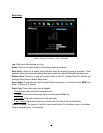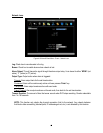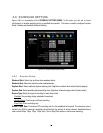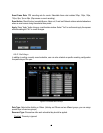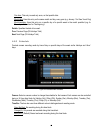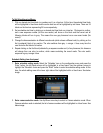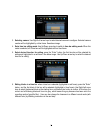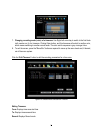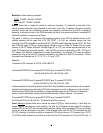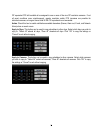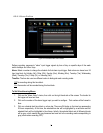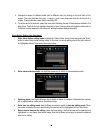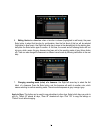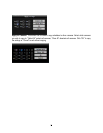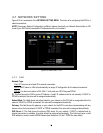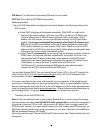
72
Resolution: Select recording resolution.
NTSC: 704x480 / 704x240 / 352x240
PAL: 704x576 / 704x288 / 352x288
Normal: Frame rate in images per second for continuous recording. It is important to keep track of the
normal recording resources being allocated at each hours of the day. Increasing the Normal recording
resolution and/or rate can inadvertently request more recording resources than the DVR is capable of
delivering, or allocate so much of the DVRs resources that there is no excess available for increased FPS
rate and/or resolution in response to an Event.
The speed is limited by the maximum total recording capacity of the DVR as allocated across all the
installed cameras, with an upper limit of 30 FPS (NTSC – 25 PAL) per individual camera (real time
recording). The DVR is capable of recording 480 CIF (352x240) sized frames per second (NTSC; 400 PAL);
each 704x240 image (2 CIF) per second requires allocation of two of those CIF frames from the overall
capacity of 480 CIF frames, and each 704x480 image (D1 or 4 CIF) per second requires allocation of four
of the CIF frames from the overall capacity. Thus the DVR can record a combination of CIF, 2 CIF and 4
CIF images, with different combinations of image size/resolution and different FPS rates on different
cameras, so long as the total CIF equivalents allocated is not greater than 480 CIF per second. Choices
for possible record speeds are 30, 15, 10, 7.5, 5, 3, 2 and 1 FPS.
Examples:
16 cameras at CIF resolution at 30 FPS: 16x30=480 FPS
2 cameras/4CIF/30FPS plus 5 cameras/2CIF/15FPS plus 9 cameras/CIF/10FPS:
2x4x30+5x2x15+9x1x10= 240+150+90 = 480
2 cameras/4CIF/30FPS plus 2 cameras/2CIF/30FPS plus 12 cameras/CIF/10FPS:
2x4x30+2x2x30+12x1x10= 240+120+120 = 480
In these examples, the recording capacity of the DVR is fully allocated to normal recording, with no reserve
capacity for increasing image size and/or FPS rate in response to a motion or alarm event (see next item).
Since EverFocus DVRs have the capability to change recorded image size and FPS rate in response to
events, it may be advisable to reserve some recording capacity for event response. For example:
2 cameras/4CIF/10FPS plus 5 cameras/2CIF/10FPS plus 9 cameras/CIF/5FPS:
2x4x10+5x2x10+9x1x5= 80+100+45 = 225 allocated with 255 in reserve.
Event: Maximum desired frame rate in frames per second (FPS) for event recording; if more than one
camera requires simultaneous event recording, the total for all cameras cannot exceed the maximum
available FPS for the DVR at the corresponding resolution setting, and the available FPS may be divided
across the cameras responding to an event. In the example above, with 225 CIF FPS allocated and 255
CIF FPS remaining, it would be possible to increase the FPS rate on the two 4 CIF cameras from 10 FPS
to 15 FPS and also increase the resolution and rate of the five 2 CIF cameras to 4 CIF and 15 FPS, with 15



